The Wheat Sheaf, Bow Brickhill
The Wheat Sheaf public house in Bow Brickhill can be traced through various adverts and events recorded in the local newspapers now online from the British Newspapers Archives. Other information here comes from the catalogue of Centre for Bucks Studies at Aylesbury, Bedfordshire Archives & Records Service at Bedford, the Bow Brickhill History Society, local trade directories, the census and parish registers etc.
The first record in the online newspapers for a Wheatsheaf at Bow Brickhill comes the same year as its first entry in a Trade Directory, in 1830. The Pigot’s directory lists William Garratt as the landlord and the Bucks Gazette of 11th December that year reported “On Monday se’nnight [a week ago Monday] a daring burglary was committed in the village of Bow Brickhill, at Mr Garrat’s, of the Wheat Sheaf, by some person who picked the lock of the back door, and afterwards, with a beam of a scale, forced out part of the brick-work of a wall, by which means they entered the room where the liquors were deposited. The house was plundered of a jar of preserves, part of a cask of peppermint, and a quantity of gin and peppermint in bottles, to the amount of £3, with which the thieves made their escape. The robbery must have been effected by persons well acquainted with the premises.” It was not reported if the culprits were ever found!
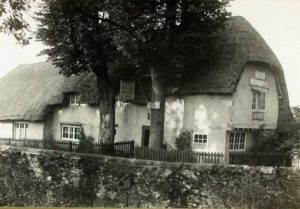
As a central village public house with a club-room, it was often used for inquests into local deaths, like this from the Bucks Gazette of 1st April 1837: “On Monday last, an Inquest was held at the Wheatsheaf, Bow Brickhill, Bucks, by B. A. Reddall, Esq., Coroner of the Honor of Ampthill, on view of the body of John Hall of Caldecot, in the former parish. Deceased who had been previously in the enjoyment of excellent health, on Saturday last complained of being poorly and went to lay on his bed, in a minute he came down stairs stating he was better and walked across the house, some chamomile tea was made for him by his daughter of which he drank, and whilst in the act of drinking he fell down and instantly expired; a Verdict of died by Visitation of God was returned by a Jury.”
Another trade directory, Robson’s of 1839, still gives William Garratt, but the only possible William Garratt in Bow Brickhill at the time of the first census (with personal data on) of 1841 is listed as just a Tailor, with no mention of licensed premises. He had an extensive family:
William Garratt, 45
Betsey Garratt, 40
William Garratt, 20
Betsey Garratt, 20
John Garratt, 15
Jane Garratt, 15
Ann Garratt, 12
Catherine Garratt, 10
Emaritha Garratt, 6
Esther Garratt, 4
Mercy Garratt, 3
George Garratt, 3m
All were born in Buckinghamshire, but the 1841 census did not give further detail on place of birth.
The Northants Mercury on 23rd September 1843 mentions a John Garratt: “On the 11th inst, at Bow Brickhill, Bucks, by the Rev. J. M. Jackson, Mr John Yeates, second son of the late Mr John Yeates, farmer, to Miss E. Garratt, second daughter of Mr. John Garratt, of the Wheat Sheaf Inn, all of the above place. From the local church registers, William’s sons, John and William, were married in 1843 and 1846 respectively. Yet it returns to a William in charge seven years later, in the Oxford Chronicle of 10th August 1850, listed under Buckingham births: “The wife of Mr W. Garratt, of the Wheatsheaf Inn at Bow Brickhill.” I imagine this must have been the son William from the 1841 census. A William Garratt died in Bow Brickhill in 1847, presumably William senior. The next census of 1851 gives William, but judging by the age, it must indeed have been passed down the family.
William Garratt, married, 32, Publican & Occupier of 10 acres, employer of 1 man, born Bow Brickhill
Caroline Garratt, wife, 30, Bedford
Charles Garratt, son, 4, Scholar
Fanny Garratt, daughter, 2, Scholar
Joshua Garratt, Son, 8m, Scholar
Mercy Garratt, sister, 11, Scholar
George Garratt, brother, 10
Sarah Roberts, aunt, 66, Bobbin servant Lacemaker, Olney
All the children had been born in Bow Brickhill.
William Garratt is shown in the 1852 Slater’s trade directory, but the next census in 1861 gives no innkeepers or public house names at all, and no William Garratt is shown anywhere in Bow Brickhill. There are, however, two David Munday’s (uncle and nephew) in the 1861 census, in separate households in Bow Brickhill, both described as Agricultural Labourers. Two years later, the Dutton’s trade directory of 1863 gives the Wheatsheaf landlord as being David Munday, and Munday was still there for the 1871 census, listed as at the Wheatsheaf, and by his given age, it must have been the one described as ‘Snr.’ in the 1861, but was he in charge of the inn then too?
To confuse matter further, there are press articles giving his name in 1867. Under Newport Pagnell Petty Sessions, the Bucks Standard of 2nd February 1867 reported: “David Munday, of Bow Brickhill, licensed victualler, was convicted for allowing gaming in his house on the 12th January. Fine and costs £1 14s.” Yet when the Buckingham Express reported the same story, it specified he was running the Plough Inn at Bow Brickhill. Someone had their pubs mixed up!
The 1871 census:
David Munday, 54, Innkeeper, The Wheatsheaf, born Fenny Stratford
Sarah Munday, wife, 33, born in Bow Brickhill
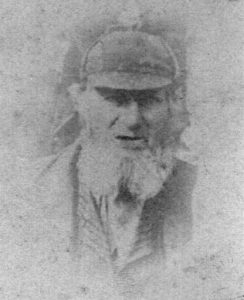
The Licensing Return of 1872 gives Munday as the licensee and Henry Fowler of Woburn as the leaseholder. Munday found himself back in court in 1874. From the Bucks Herald 25th July: “David Munday, victualler, of Bow Brickhill, who was defended by Mr. Walter Bull, was fined £5, including costs, for cruelly illtreating a dog, at Simpson, on 3rd June. Mr. Andrews, officer from the Society for the Prevention of Cruelty to Animals, prosecuted. Defendant was seen by Mr. John Sipthorp on the day in question, on the canal bank, at Simpson, to tie a string round the dog’s nose, then cut its throat with a knife, and afterwards throw it into the canal, when the dog swam out and made its way home. Mr. Henry Taylor, superintendent of the Royal Humane Society, proved visiting the defendant, who admitted the offence and made a statement, and expressed the hope that if summoned he would be fined and not sent to prison. The defence was that the dog jumped at the head of the horse defendant was driving, and was knocked down, the cart wheel going over it, and defendant, thinking it was seriously injured, thought the best thing would be to destroy it, which he attempted to do in the manner described by Mr. Sipthorp.”
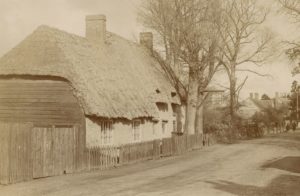
Munday left the Wheatsheaf before the end of the year, according to the Bucks Herald of 12th December 1874: “Transfers: “The Wheatsheaf, Bow Brickhill, from David Munday to William Scott”. Munday was leaving to take the Bull at Little Brickhill, but he only stayed there two years and died in 1877.
Another Coroner’s Inquest was held at the inn in May 1880. No doubt this petty criminal thought he was making a daring escape, but sadly it ended in tragedy: “BOW BRICKHILL. A Death Leap. The quietude of the village was disturbed on Saturday by hearing of the suicide of a man who hurled himself from the train passing the village between 12 and 1 o’clock. He was picked up quite dead. He was a man of fine appearance and muscular development, about 25 years of age; his head was literally cut asunder and the brains protruded. On Monday an inquest was held at the Wheatsheaf, before Mr. Wiseman, deputy coroner. Mr. Charles Armstrong Day, farmer, was foreman. It seemed that a police constable from Rugby, named Parker, had arrested the man, known as Huntley or Saunders, at Bedford, on a charge of misdemeanour. He did not handcuff him, as the man willingly surrendered, and his instructions were from his superior officer not to handcuff a prisoner of inferior physical power to himself. On passing Bow Brickhill he said he wanted to relieve himself, and he said wait till we come to Bletchley. Prisoner, however, went towards the door, opened it and jumped out. He endeavoured to hold him but could not. There was a youth in the train, who was in prisoner’s employ, and accompanied him. On reaching Bletchley he gave information and an engine was dispatched to the spot where they found the man quite dead, bleeding from the head. The man was perfectly subdued in his manner, and asked the names of the Rugby solicitors. Mr. Frederick Dynes, surgeon, Fenny Stratford, spoke to seeing the man in the 6ft. way, quite dead; there was a compound fracture of the skull, exposing the brain, laying it completely bare; death must have been instantaneous. George Chapman, a youth about 18 who had been in the employ of deceased, corroborated the evidence of the police officer. He had only been casually employed by the deceased, and at his request accompanied him with the officer, who paid their fares from Bedford to Rugby. Whilst he had been in his employ, he was sober although fond of talking and joking. He knew nothing further of him. Joseph Clarke, the driver of the goods train that followed the express, gave evidence as to seeing the body and stopping his train. John Allen, the guard, said the poor fellow was lying with his face downwards in a pool of blood quite dead, with one hand under his body, the other on his head. The Coroner said he thought the evidence indicated that it was the man’s intention to escape from custody, and not to destroy himself. The Jury returned a verdict of “Accidental Death.” Mr. Superintendent Hedley of Fenny Stratford gave instructions that the body should be washed and well attended to. Nothing is known of the poor man’s antecedent. Mr. John Palmer, the Police Superintendent of Rugby, spoke to sending Parker the constable with a warrant to arrest him for obtaining 12s. 6d. under false pretences. He had heard deceased’s father was a tailor in London. The deceased was buried in Bow Brickhill Churchyard on Tuesday night, under the directions of Mr. Warren, undertaker, of Fenny Stratford.” (Luton Times)
No doubt the inn had started out brewing it’s own beer, but at some point, possibly after the Garratt’s had left, it had eventually come under the control of the Fowler brother’s brewery of Woburn, based at what we know as The Birch. Their whole business was put up for sale in March 1881. The Fowler brothers had fallen on hard times, and one of them ended up in the Bedford Lunatic Asylum, for which payment was required, and funds needed to be raised.
The Leighton Buzzard Observer of 8th March 1881 has a long report of the sale. Mr Alfred Thomas, auctioneer, first tried to sell Grove House in Aspley Guise, but there were no adequate bids. “The next property put up consisted of the Woburn Brewery and twelve leasehold public and beer houses – the White Bear, Woburn; Rose & Crown, Ridgmount; George & Dragon, Little Brickhill; White Hart, Fenny Stratford; Swan and White Horse, Stewkley; a beerhouse in New Town Street, Luton; Fleur-de-Lys, Hockliffe; Bell, Toddington; Cock, Tebworth; Red Lion, Sundon; and a beerhouse at Ivinghoe. The sale was subject to reserve bidding fixed by the Masters in Lunacy. This property also failed to meet with a buyer, doubtless from the condition that the plant &c should be taken over by valuation, although Mr Thomas stated that it would probably be found the cheapest lot in the day’s sale.
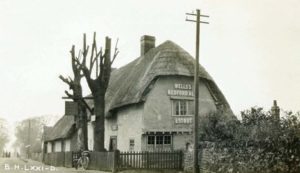
He next put up the following twenty-four freehold houses – Malt House, Woburn, and the Birchmoor Arms; King’s Arms, Little Brickhill; Spinning Wheel, Great Brickhill; Wheatsheaf, Bow Brickhill; Chequers, Fenny Stratford; George, Water Eaton; Red Lion, Newton Longville; Plough, Shenley; Stag, Leighton Buzzard; Bell Inn, Hockliffe; Victoria, Dunstable; Fountain, Luton (Wellington Street): Marquis of Bute, Luton (Alma Street); Bell, Totternhoe; Fountain, Eaton Bray; Prince of Wales, Eddlesborough; Red Lion, Eversholt; Nag’s Head, Westoning; Drovers’ Arms, Steppingley; Anchor, Aspley Guise; May Pole, Aspley Guise; Queen’s Head, Ampthill; Carpenter’s Arms, Cranfield; and Bricklayers’ Arms, Bedford (St. John Street).
These houses realised collectively the sum of £14,560. One of them (the Fountain, Luton), let at only £15 a year, sold for £1,500, being 100 years’ purchase on the rental. The collective rentals amounted to £285 year.”
Charles Wells, the brewers of Bedford, bought nine of the lots for a total of £4,480 and this included the Wheatsheaf at Bow Brickhill. A copy of the sale particulars is stored in Bedford Archives & Records Service (WL1000/10/1/1) which gives us the incumbent landlord, which had by then changed from Scott. The Wheatsheaf was Lot 4 and described as: “Wheatsheaf Public House, Bow Brickhill, tap room, living room and parlour, club room, upland pantry and cellar, three bedrooms; yard with stable, washhouse and cart lodge; garden at rear; let to George Gee at £12 per annum.”
The next month it was census time again, and the Gee family are all recorded:
George Gee, 37, Publican, born Stamford, Lincoln
Caroline Gee, wife, 38
Martha Gee, daughter, 13
Annie Gee, daughter, 7
George Gee, son, 4
Polly Gee, daughter, 5 months
(Mrs. Gee and all the children had been born in Bow Brickhill.)
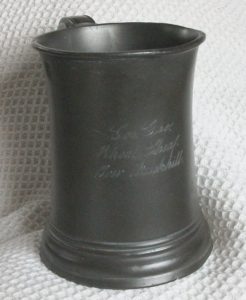
Gee was charged with serving alcohol during prohibited hours on March 11th 1882. Police Sgt. Hinton said he watched the inn after receiving complaints about it. At five and ten minutes past the stipulated 10 o’clock closing time, he saw persons entering the inn. At 14 minutes past, he entered and saw the landlady supplying a customer with some tobacco. A customer called Jackson had a ½-gallon bottle of beer in his hand and about a dozen other people were present. P.C. Neal also attended and said several men swiftly left out of the front and back doors when they entered! The defence lawyer said there was no proof that any alcohol had been served after the 10pm cut-off. It was mentioned that Gee had previously kept the Navigation Inn at Fenny Stratford for four years, with no convictions while he was there. (The Navigation was later rebuilt as the Bridge Inn, only closing in my lifetime.) The Bench settled on a nominal fine of 10s. and 13s. 6d. costs or 14 days. (Croydon’s Weekly Standard)
Such convictions could easily spell the end of a landlord if the local Magistrates were so minded. Repeat offences were particularly frowned on, but it seems Gee tightened up on his adherence to the law. When the Annual Licensing event came around in August, the conviction was brought up, but as the house had been well conducted before and since that occurrence, so Gee’s license was granted for the next year. (Bucks Herald) A heavy pewter tankard is still in the village bearing the inscription “Geo. Gee, Wheat Sheaf, Bow Brickhill”.
The Wheatsheaf saw the last ever meeting of the Bow Brickhill Poor Man’s Friendly Society in their club-room on January 8th 1884. It had been established in 1833 by the Rev. Stephen Davies as a social care funding scheme that the Parish didn’t have to contribute to. It was also felt it tied up excess money that the labourers had and kept them out of the public houses! Members paid in small contributions each week, and could draw on the money if sick or injured and unable to work. It had been decided to wind up the club and split the £197 balance between the 43 remaining members, as no new young men were now joining it. The dinner consisted of baked puddings, roast and boiled beef and mutton, boiled legs of pork with vegetables and plum puddings. Each member received £4 2s. 6d. (Leighton Buzzard Observer)
In September 1889, Gee’s daughter Martha was married to William Barden, and George Gee, as father of the bride, was listed as a publican still. By November 1889, Gee was renting a local cottage in Bow Brickhill which was being auctioned, so perhaps he had already left the pub by this time. He was certainly a ‘General Shop Grocer and Coal Dealer’ in Bow Brickhill by the time of the next census of 1891. He was summonsed for selling adulterated butter, according to a report in the North Bucks Flying Post in 1893. He was fined £2 with £1 2s. costs. He was still in the village in June 1905, when he was advertising two newly-built houses, nos. 1 & 3 Regent Street, Bletchley for sale in the Bucks Standard.
Back to the 1891 census, and The Wheat Sheaf had been handed on from Gee to George Wilson:
Wheat Sheaf Inn
George Wilson, 46, Inn Keeper, born in Eversholt
Annie Wilson, wife, 39, born Water Hall, Salford
Georgina Francis, visitor, single 27, Maulden
George Francis, visitor’s son, 3, Fenny Stratford
James Francis, visitor’s son, 1, Fenny Stratford
No landlord is mentioned at an event held in May 1891: “Bow Brickhill. Club Feast. The Foresters had their usual club-feast dinner on Wednesday, at the Wheat Sheaf Inn. The total worth of the society is £513 19s. 9d. and the number of members in ninety-two. The Woburn Sands Brass Band was in attendance.” (Leighton Buzzard Observer – 26th May 1891)
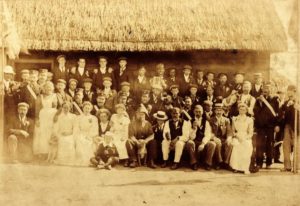
It is Mrs. G. Wilson who appears in a Kelly’s directory in 1899, so it appears Annie had been widowed by this point. A George Wilson’s death had been recorded locally in 1893. New occupants were in place by the next census in 1901, but we do not know when the change happened:
Wheatsheaf Inn
John F. Russell, 32, Publican, born Gamblingay, Cambs.
Ellen Russell, wife, 30, also from Gamblingay
A Rural District Council meeting approved plans for “a new barn &c.” at the “Wheatsheaf” Inn, Bow Brickhill for Mr Wells, [Charles Wells, Bedford] submitted by Usher & Anthony of Bedford. (Beds Times – 12th June 1903)
In May 1905, Russell was charged with supplying beer to a police officer on duty. The defendant said he had held the license for over five years without any complaint. He poured P.C. Crockford some of his own supper beer, “quite innocently and in good nature”, in front of Police Sgt. Callaway. The Charles Wells’ brewery representative, Mr. Finch, as well as Police Superintendent Lait, gave Russell an excellent character reference, and the Bench decided not to record a conviction, if Russell paid the 5s. costs. (Buckingham Advertiser)
Russell ran the pub for just under ten years. The Northampton Mercury of 29th October 1909 reported that at the Divisional Petty Sessions, the Wheatsheaf was transferred “from Mr. Russell to Mr. Blackton”, yet it seems they hadn’t heard the new licensee’s name correctly, as it was a slightly different version in the census in 1911:
Wheatsheaf
William Blackman, 37, Retailer of wine, beer and spirits, born Funtington, Sussex
Elizabeth Blackman 38, from Eyrsham, Northampton
Blackman was applying for an extension of an hour, for 10-11pm for Coronation Day celebrations in 1911. The North Bucks Licensed Victuallers Association tried to get a blanket extension for all their members, but the Bench said there was no procedure in place to do that and that every public house would need to apply individually.
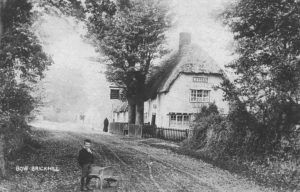
The Wheatsheaf’s marking of the coronation was duly reported: “On Thursday evening a supper was held at the Wheatsheaf Inn. Twenty-six sat down. and a splendid repast was provided. The carvers were Mr. Edward Bailey and Mr. A. Willisford Jackson. The tables looked very enticing. Amongst those present were Mr. J. Careless, Mr. W. Rose, Mr. White. of Fenny Stratford; Mr. F. Frost, and Mr. Chamberlain, Mr. W. Hartwell and Mr. W. North. After full justice to all the good things was done, grace was said by Mr. Bailey, and Mr. Jackson proposed the loyal toast, which was heartily responded to. Mr. Jackson proposed a vote of thanks to Mr. and Mrs. Blackman, the host and hostess, to which Mr. Blackman suitably responded. After the cloth was cleared. There was a smoking concert, Mr. W. Hartwell presiding at the piano. The contributions included: – Song, “Hearts of Oak.” Mr. W. North; song, “The Light of Day.” Mr. H. Taylor; song, “La la la la.” by Mr. W. Hartwell; song. “I will stand by my Friend.” Mr. W. Ross; a concertina solo. Mr. Chamberlain; song, “If those lips could only speak,” Mr. Albert Barden; song. ” I’m afraid to go home in the dark,” Mr. Alfred Barden jun.; song, “Just before the battle, mother.” Mr. Arthur West; song. “Three cheers for the red, white and blue,” Mr. Joseph West; song, ” Hooligan,” Mr. J. Careless. Much regret was expressed when the landlord called “time,” and a very pleasant evening was brought to a close with the singing of “Auld Lang Syne.” (Bedford Record)
In November 1911, the Wheatsheaf hosted the annual Bow Brickhill Feast, with dancing till closing time, but the Bedford Record lamented the absence of “Shows” for the juveniles. Blackman was in the North Bucks Licensed Holders association, attending their meetings in 1913.
The Royal Commission on the Historical Monuments of England reported in 1913, and the local area was covered in the volume “An Inventory of the Historical Monuments in Buckinghamshire, Volume 2, North.” It contains this detailed description: “The Wheatsheaf Inn, about 500 ft. W. of [Poplar Farm] is a house of two storeys, built probably late in the 16th century, subsequently enlarged and considerable restored. The walls are timber-framed, with filing of thin bricks, and covered with plaster. On the S. front the lower end is of modern brick. The roof is thatched. At the E. end of the building the upper storey projects; at the W. end, enclosed by a modern addition, is a large projecting chimney stack, and the central chimney stack has a base of thin bricks. Interior:- The original timber construction and the large trusses of the roof are visible. There is one wide, open fireplace, partly blocked. Condition – Fairly good.”
Blackman moved on in October 1914, to the Bell in Stoke Hammond. He was to be replaced by a Mr. Hardwick. (Bucks Advertiser). There are very few mentions of the Wheatsheaf during the war, but the North Bucks Times pointed out that he annual Bow Brickhill Feast passed off very quietly in November 1915. As Mr. Tansley had signed up, “there wasn’t even a piccolo to tempt the young men and maidens to dance in the old Club Room at the Wheatsheaf Inn.”
After the end of the war, William Hardwick joined the North Bucks Licenced Victuallers and Beersellers’ Protection Association. (Northampton Mercury – 18th July 1919). Hardwick appears in the 1915 & 1924 Kelly’s Directories.
Charles Wells Ltd compiled a photographic album of all their estate in approximately 1925. These are now stored at Bedfordshire Archives & Records Service. The Wheatsheaf was included (WL800/5, negative WL801/85) and the name of the licensee can be seen on the sign above the door as William Hardwick. Is it the old or new building? Hardwick’s son, Horace, made a painting of the inn, showing the old building
Hardwick was there running the pub, without any newsworthy events, until 1926. Then a strange event unravelled in the press. The first, in the Buckingham Advertiser of 9th January, says he had “surrendered to bail on a charge of feloniously setting fire to bedding, clothing, furniture and paper, in the “Wheatsheaf” Inn, Bow Brickhill and it was alleged the money belonging to the Bow Brickhill Slate Club had all been incinerated. Hardwick, 50, was sent for trial at the next Bucks Assizes. The Bucks Herald (16th January) added that the sum missing was £84 1s. 6d., belonging to the Wheatsheaf Sick and Dividing [Dividend?] Club. The trial took place before the end of the month where he was charged with arson and fraudulently converting the club money to his own use. The prosecutor outlined how Reg Miles, a member of the club, had been in the Wheatsheaf on December 16th, with Hardwick, when Hardwick’s daughter Phyllis pointed out that there was smoke in the house. Hardwick and his wife went upstairs to investigate, then Mrs. Hardwick shouted downstairs that there was a fire. For some reason, entry could not be immediately gained to the room on fire, so a ladder was fetched from across the road and Hardwick went up to take a look. During this time, Miles managed to enter the room via the door and found the bed alight at the head-end, which was well away from the fireplace in that room. He doused the fire with a pail of water. A deck chair was also damaged in the room, and a small tin box was empty nearby. There was no evidence of how the fire had spread from the grate to the chair or the bed. Hardwick then claimed that £80-£90 had been in the tin, the club money and some of his own, all in notes and it had burned. Hardwick had made a claim to his insurance agents, but loss of cash and documents wasn’t covered in his policy. John West, the secretary of the club, testified it had 122 local members. A policeman who attended the next day said he was shown a pile of charred bedclothes and wood in the garden, but there were no remains of any treasury notes. The bedclothes smelt of paraffin, but Mrs. Hardwick said this was because she used paraffin and beeswax to polish her floors. Bizarrely, here the Jury interjected and said they did not want to hear any further evidence from the prosecutor and would return a verdict of Not Guilty of arson. As that case had failed, the Judge said there was no point in continuing with the other charge of fraud, and so Mr. Hardwick was free to go.
I imagine this was met with great resentment in the local community, and the Buckingham Advertiser of the very next day reported: “A temporary transfer of the licence of the Wheatsheaf Inn, Bow Brickhill, was granted to Sidney Thomas Carr, Bow Brickhill, from W. Hardwick.”
Carr was certainly still there in 1928 as he appears in the Kelly’s Directory and also the Register of Electors. He had some postcards made of the Wheatsheaf, which give us the earliest images of the new pub building, but there is no indication at all in the press of this having happened. The fire in 1926 was confined to one room and a few items, so it does not appear to have burnt the house down. The old Wheatsheaf appears on postcards circa 1905-1915. The new one must have been erected before Carr left which was, at the latest, 1929 when the Register of Electors began to list Eustace Frank Stone at the Wheatsheaf.
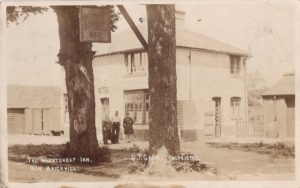
Stone saw the pub through the Second World War. In 1939, an extra census was taken for issuing the national ID cards. At the Wheatsheaf were listed:
Eustace F. Stone, 46, Innkeeper and Wood Merchant “Heavy worker”
Caroline M. Stone, 37, Landlady
[One other entry redacted as possibly still alive.]
In December 1941, a large court case took place. A night-watchman from Woburn Sands, who was employed at the Tetley tea factory in Bletchley, helped himself to over 100lbs. of the national British beverage which was by then rationed. He made himself some money by selling it around the district. The authorities caught up with him and he swiftly confessed the names of those who had bought it from him. This included the landlords of both the Wheatsheaf and Plough pubs in Bow Brickhill. The thief got three months, but the authorities also decided to charge the 14 people who had bought tea from him. The two Bow Brickhill landlords were fined a total of £13 12s. each.
Having served in the First World War with the Royal Engineers, Stone was also part of the local Home Guard. He obviously had some history with the Commanding Officer, Lieut. Garratt, as he refused to attend those parades which Garratt was commanding. This was treated as being “Absent from duty”. Ignoring verbal and written orders, it eventually came to court and having only attended 23 out of 73 parades, Stone was fined £10 with 14s. costs. He said he didn’t have time and would rather go to prison than attend Garratts’s parades! (Wolverton Express – January 1944)
The late Ted Enever, in his book “Changing Faces, Changing Places”, says that Eustace also ran a timber business with his brother, Sydney, which fits in with his army records saying he was a sawyer. There is also an excellent reference from his ex-employers at Rowlands Steam Mills in Bletchley.
The Bow Brickhill Historical Society published a Village Trail in which it says the Wheatsheaf building was extended in about 1974. This was about the same time that Eustace Stone left due to ill health. He died in 1978.
There is a small report mentioning the Wheatsheaf licensee was Albert Stocker in March 1975, as he had a car accident in the Leys, Woburn Sands. He and his wife baptised a child in Bow Brickhill in 1977, when he was still listed as licensee of the Wheatsheaf.
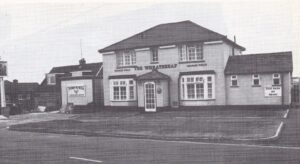
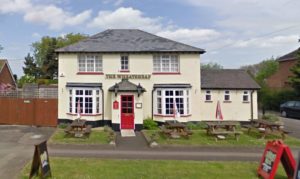
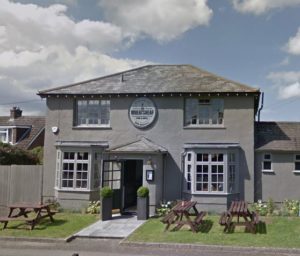
When my parents left the Fir Tree in 1997, it was taken on by the Michael and Dean Readyhoff, father and son, who were already running the Wheatsheaf. They kept the Wheatsheaf on as well, and ran both for a year or so, before leaving the area. A Michael Robinson appears in the Bow Brickhill church registers as father of a groom in 1988, listed as Publican, at the Wheatsheaf.
There was a short period that the Wheatsheaf was closed up in the early 21st century, looking very dilapidated, but it was taken on by Denise Redding & Simon Sparrow, who refurbished the back room into a proper restaurant and turned it into a great food destination. After they left, it joined the local Epic Pubs group, and was painted a curious shade of battleship grey. A few years later, this became the Heroic Pubs group. It changed hands again, to Coopers group in 2019. They redecorated it, inside and outside, as well as extending the premises again. It is now known as The Wheatsheaf Pub & Grill, and is part of the Coopers Grillhouse brand, which reopened its doors on 20th November 2019.
Landlords
-1830- Mr. Garrat
-1843- John Garratt (son of the above)
-1850-1852- William Garratt (brother of the above)
-1863-1874 David Munday
1874- William Scott
-1881-1889- George Gee
-1891-1893 George Wilson
1893-1899- Annie Wilson (widow of the above)
-1900-1909 John Frederick Russell
1909-1914 William Blackman
1914-1926 William Hardwick
1926-1928 Sidney Thomas Carr (New house built by time he left)
1929-c.1974 Eustace Frank Stone
-1975-1977- Albert & Gwen Stocker
-1987- Dean & Michael Readyhoff (also had the Fir Tree at the same time)
-1984-1988- Michael Robinson
????-???? Denise Redding & Simon Sparrow
Brewery
1830 On site?
-1872-1881 Fowlers of Woburn
1881- Charles Wells
2017 Epic Pubs / Heroic Pubs
2019 Coopers Grillhouse
Page last updated April 2020.
